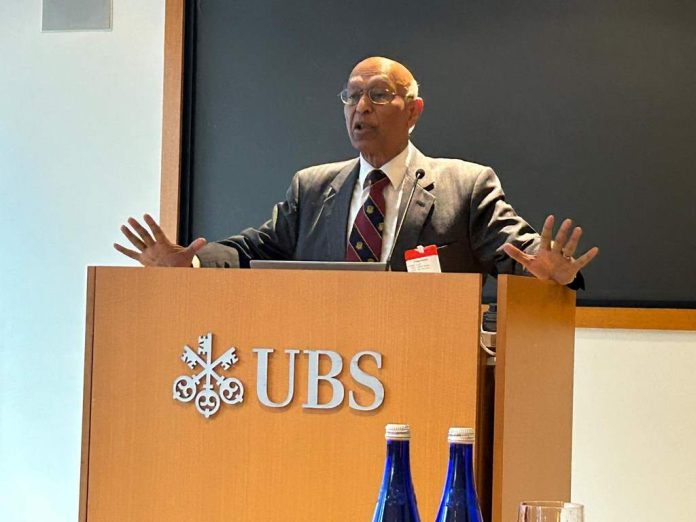NEW YORK: GOPIO Chamber of Commerce and Industry (GCCI) co-hosted a talk by UK-based Prof. Prabhu Guptara, Executive Chairman, Salt Desert Media, UK, and a former advisor to UBS. The talk was hosted by UBS at its headquarters in New York City early this month. Prof. Guptara spoke on “Technology and the Future: What are the implications, risks and opportunities.” The talk covered the effects of disruptive technologies on our society such as Artificial Intelligence, the Internet of Things, Robotics, and Quantum Computing.
Prof. Guptara is a public intellectual, and business advisor, focusing on the future of technology. Forty years ago, he learned to program on mainframe computers. For 15 years, he advised the Board of UBS, the world’s leading wealth manager, and organized UBS Think Tanks: pioneering Internet Banking, offshoring, and other initiatives. He was a visiting professor at Wharton, University of Fribourg, INSEAD, etc.
The program started with a welcome by UBS Senior Vice President Ranjeet Guptara. GOPIO Chairman Dr. Thomas Abraham spoke about the Global Organization of People of Indian Origin (GOPIO) and the GCCI and how GCCI will provide a networking platform for small and medium businesses from the Diaspora and further connect them to Indian businesses. GOPIO‘s Global Ambassador Prakash Shah and representatives from Connecticut, Manhattan, and New Jersey chapters were also present.
Having surveyed the history of technology from ancient times, Prof. Guptara asked why the knowledge behind those technologies disappeared so completely, suggesting that these technologies were for the benefit of the elite, at the cost of the majority of the population; and the elite regarded knowledge as power, and therefore guarded it jealously, which meant that only a very few people had to die, from natural or human causes, for any technological secret to be lost.
Prof. Guptara then raised a question, “What are the lessons from that for our own time?”
Pointing out that the Protestant Reformation was key to understanding the rise of modern technologies, he surveyed their contributions to modern life. As a result, a huge part of the world now has a lifestyle that would have been the envy of even emperors from the past. There have been many enabling technologies in the recent past, but all those put together don’t match the impact that quantum computing is already having – and it will have an even faster and hugely greater impact in the immediate future. In just 5 years, quantum capability has arguably grown theoretically by 347.8 orders of magnitude – and certainly in reality by something like 100 times already. Applied just to manufacturing, the result is possibly prosperity at such a huge scale that material things lose value entirely (value is a function of demand vs supply, and if demand e.g. for food and clothes grows at say 5% a year despite a foreseeably collapsing world population, but availability of food and clothes is more or less infinite, then the conclusion for the price of food and clothes is obvious). To take just that consequence seriously, what changes are needed in social political, and economic arrangements to enable us to transition peacefully to such unimaginable prosperity?
But, looking more mundanely at the problems facing our global reality, could we not say that these are: Debt out of control; Unsustainable and still rising pay differentials and wealth inequality; Financial economy vs. real economy; Unaccountable corporations; Looming care crisis; Family breakdown; Generational inequality and Managing the environmental crisis.
Prof. Guptara then raised another question, “Can Quantum technology help us with such real issues?”
The fact is that no technology is “neutral” – all technologies are both good *and* evil; technology is essentially a multiplier – of good as well as evil.
So can any kind of technology save us? No, because humans have always used, and will always (if possible) use tech in evil ways; but also YES, to the degree that tech is used in good ways. In that case, can individuals (or individual companies) determine whether technology is used for good or ill? YES, at their level; but NO at larger levels – e.g., the economy as a whole. And, in that case, at the level of the whole economy, what are the things that determine whether good uses of technology are encouraged – and evil uses of technology are discouraged?
GOPIO and UBS officials after the talk by Prof. Prabhu Guptara
The global economic and political structures behind our real crises take as their foundational assumptions the following basic untruths:
- People are individuals who are mainly decision-making units
- Money is the most effective measure of value
- Relationships are no more than political or economic connections.
He concluded that if we rid ourselves of these untruths, and reform our global economic and political structures accordingly, technology will then stop performing the dual role of solving as well as magnifying problems, and start performing much more of a systemically positive role.
About GCCI – GOPIO Chamber of Commerce and Industry was launched as a networking platform for the Indian Diaspora businesses worldwide. It hopes to connect micro, small, and medium businesses,s and professional practitioners in a locality or city through its chapters and with their counterparts in INDIA

